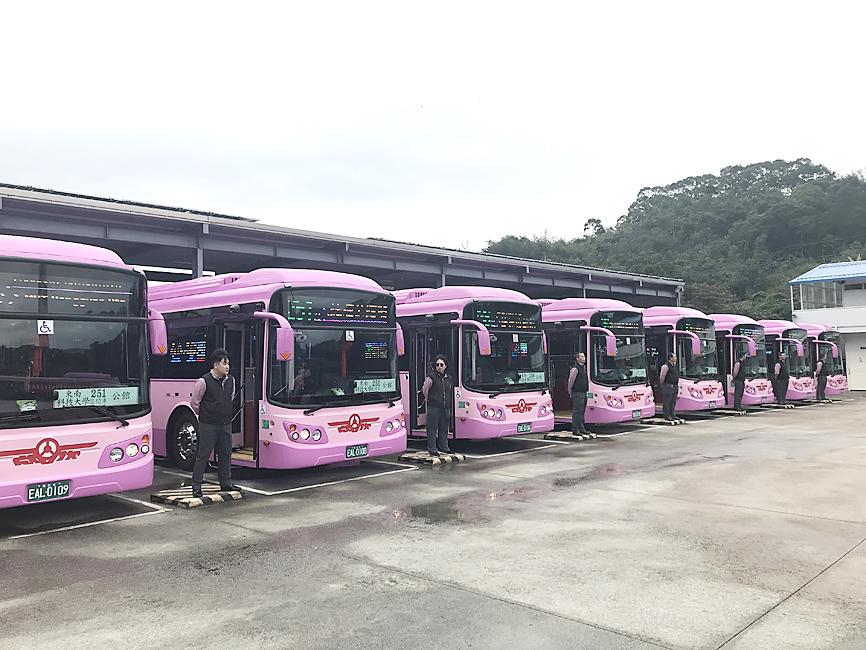The Taipei City Government has added 16 electric buses to its fleet, in a push to cut carbon emissions and noise pollution, the Taipei Department of Transportation told a news conference on Monday.
Shin-Shin Bus, a bus operator, has replaced 16 diesel-powered buses, which served the 236 and 251 shuttle lines, with electric vehicles, department Director Chen Hsueh-tai (陳學台) said, adding that the move was part of a planned decommissioning of aging buses.
Under the Executive Yuan directive for replacing all urban public buses with electric vehicles by 2030, Taipei began introducing electric buses to its fleet in 2018 and expects to have put 529 electric buses on the road by 2022, he said.

Photo: Tsai Szu-pei, Taipei Times
Prices for diesel-engined buses, which cost about NT$5 million (US$175,396) per vehicle, are initially cheaper than electric buses, but they pollute, require more expensive servicing and are more expensive to operate, Chen said.
Due to engine noise and vibrations, they are less comfortable for passengers, he added.
Electric buses cost from NT$10 million to NT$12 million, but they save costs, and offer more comfort and safety, he said.
Advanced driver-assistance system, which are standard on electric buses, could warn the driver of dangerous situations, for example when the gap between the bus and other vehicles is too small, when the driver unintentionally leaves a lane or drives at excessive speed, Chen said.
Taipei’s low-floored diesel buses are typically used for eight years, while properly maintained electric buses are expected to remain in service for about 12 years, he said.
Taipei this year granted subsidies to bus operators for the purchase of 258 electric buses and requested central government subsidies for 223 more vehicles, in a bid to meet the 2022 targets, Chen said.

Japanese footwear brand Onitsuka Tiger today issued a public apology and said it has suspended an employee amid allegations that the staff member discriminated against a Vietnamese customer at its Taipei 101 store. Posting on the social media platform Threads yesterday, a user said that an employee at the store said that “those shoes are very expensive” when her friend, who is a migrant worker from Vietnam, asked for assistance. The employee then ignored her until she asked again, to which she replied: "We don't have a size 37." The post had amassed nearly 26,000 likes and 916 comments as of this

US President Donald Trump said "it’s up to" Chinese President Xi Jinping (習近平) what China does on Taiwan, but that he would be "very unhappy" with a change in the "status quo," the New York Times said in an interview published yesterday. Xi "considers it to be a part of China, and that’s up to him what he’s going to be doing," Trump told the newspaper on Wednesday. "But I’ve expressed to him that I would be very unhappy if he did that, and I don’t think he’ll do that," he added. "I hope he doesn’t do that." Trump made the comments in

Tourism in Kenting fell to a historic low for the second consecutive year last year, impacting hotels and other local businesses that rely on a steady stream of domestic tourists, the latest data showed. A total of 2.139 million tourists visited Kenting last year, down slightly from 2.14 million in 2024, the data showed. The number of tourists who visited the national park on the Hengchun Peninsula peaked in 2015 at 8.37 million people. That number has been below 2.2 million for two years, although there was a spike in October last year due to multiple long weekends. The occupancy rate for hotels

A cold surge advisory was today issued for 18 cities and counties across Taiwan, with temperatures of below 10°C forecast during the day and into tonight, the Central Weather Administration (CWA) said. New Taipei City, Taipei, Taoyuan and Hsinchu, Miaoli and Yilan counties are expected to experience sustained temperatures of 10°C or lower, the CWA said. Temperatures are likely to temporarily drop below 10°C in most other areas, except Taitung, Pingtung, Penghu and Lienchiang (Matsu) counties, CWA data showed. The cold weather is being caused by a strong continental cold air mass, combined with radiative cooling, a process in which heat escapes from